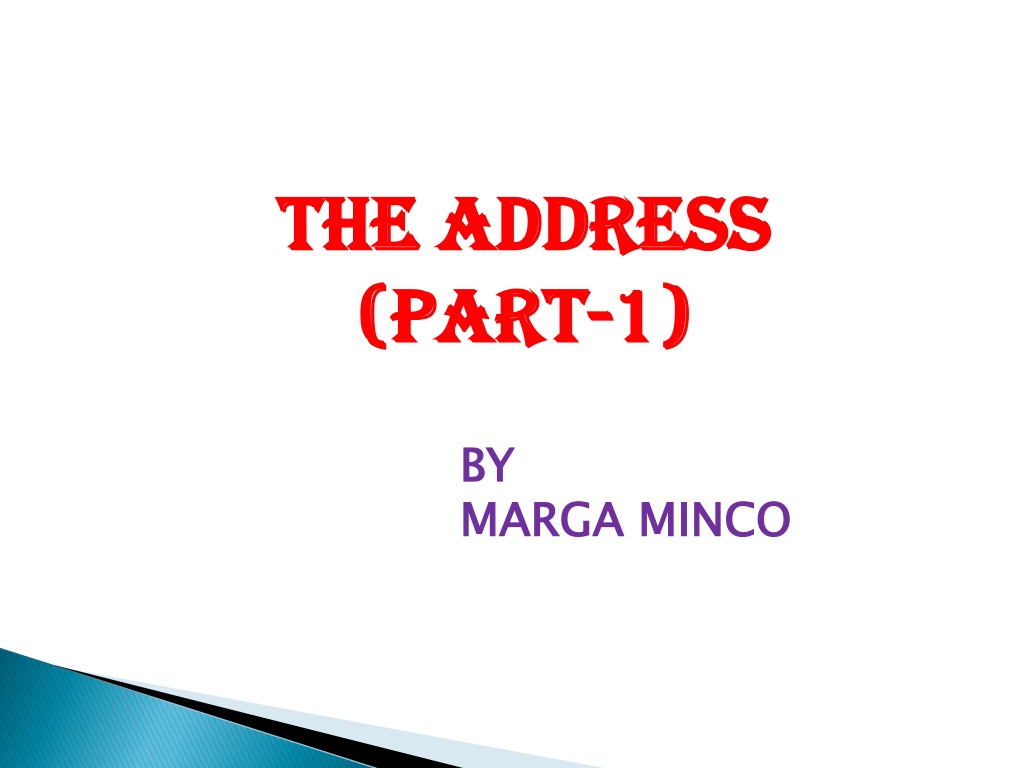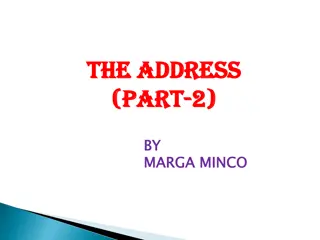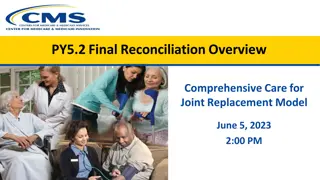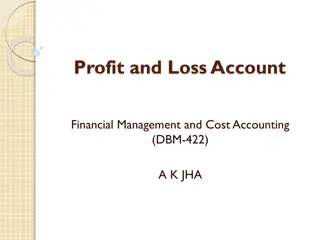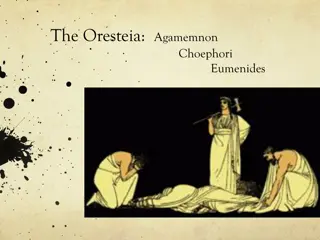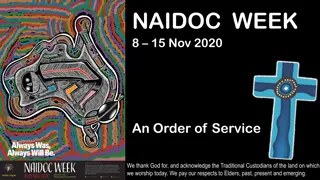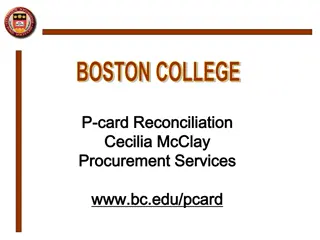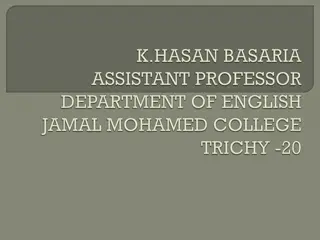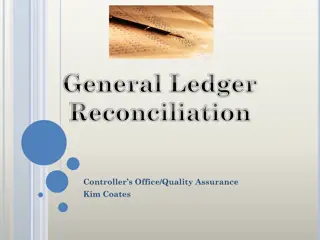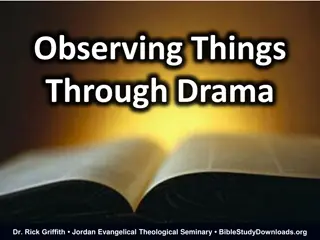The Address (Part 1) by Marga Minco - Tale of Loss and Reconciliation
After a cold reception at Mrs. Dorling's house, the protagonist recalls the past and decides to retrieve possessions left behind. Memories of wartime experiences and a bittersweet connection with acquaintances highlight the human predicament in a post-war period.
Download Presentation

Please find below an Image/Link to download the presentation.
The content on the website is provided AS IS for your information and personal use only. It may not be sold, licensed, or shared on other websites without obtaining consent from the author. Download presentation by click this link. If you encounter any issues during the download, it is possible that the publisher has removed the file from their server.
E N D
Presentation Transcript
THE ADDRESS THE ADDRESS (PART (PART- -1) 1) BY MARGA MINCO BY MARGA MINCO
Marga born 31 March 1920) is a Dutch journalist and writer. Her real surname was Menco, but an official accidentally switched the first vowel. She was born in Ginneken to an Orthodox Jewish family. In 1957 Minco published her first book, Het bittere kruid ("The bitter herb"). Marga Minco Minco (pseudonym of Sara Sara Menco Menco,
IMPORTANR CHARACTERS IMPORTANR CHARACTERS: : 1. 1.Mrs. S Mrs. S who was a Jews was a rich lady. who was a Jews was a rich lady. 2. 2.Mrs. Dorling Mrs. Dorling was a non was a non- -Jews. Jews. 3. 3.The girl (Narrator), The girl (Narrator), daughter of Mrs. S, daughter of Mrs. S,
follows the pre who was a Jews was a rich lady. Whereas, Mrs. Dorling was a non had lost her house and her mother during the war. possessions from Mrs. Dorling, an acquaintance whose address was given by her mother years ago. When she reached the house, the woman treated her with a cold reception and didn t let her into the house. daughter who let her in and told her to wait inside. When she saw all the possessions in front of her, she couldn t connect with them and decided to leave the house The story is about the human predicament that follows the pre- -War and Post who was a Jews was a rich lady. Whereas, Mrs. Dorling was a non- -Jews. The girl, daughter of Mrs. S, had lost her house and her mother during the war. Now she had decided to come back to take her possessions from Mrs. Dorling, an acquaintance whose address was given by her mother years ago. When she reached the house, the woman treated her with a cold reception and didn t let her into the house. She decided to go back anyway and then she met her daughter who let her in and told her to wait inside. When she saw all the possessions in front of her, she couldn t connect with them and decided to leave the house The story is about the human predicament that War and Post- -War period. Mrs. S 1. 1. War period. Mrs. S Jews. The girl, daughter of Mrs. S, Now she had decided to come back to take her 2. 2. She decided to go back anyway and then she met her 3. 3.
Summary After ringing the doorbell of Mrs. Dorling who lived at Number 46, Marconi Street, the protagonist was given a cold reception and Mrs Dorling took much time to recognize her. Mrs Dorling had thought everyone in the protanogist s family was dead and asked if anyone else had come along with her. Mrs Dorling refused to let the protagonist inside her home and told her to come back sometime later. The protagonist recognized her mother s green cardigan which Mrs Dorling was wearing. She decided to go back to the train station and thought about her mother and how she told her about Mrs. Dorling who was an acquaintance of hers. During the war, Mrs Dorling would visit their house and take their possessions with her as she didn t want them to get lost if they ever left the place.
The protagonist decided to go to Mrs Dorlings home to get back their belongings. When she rang the bell, Mrs. Dorling s daughter answered the door. She let her in and asked her to wait in the living room. When they were crossing the passage, the protagonist noticed their Hanukkah candle stand that they had never used because it had been unmanageable. When she reached the living room, she was horrified as she saw all her mother s things that were arranged in a tasteless manner. The furniture was ugly and the room had a muggy smell and it made her disinterested and she wanted to leave the place. Mrs. Dorling s daughter offered her a cup of tea and the protagonist noticed the old table cloth that had a burn mark on it. When the girl was showing her the silver fork and spoons that actually belonged to the protagonist, she jumped up and walked out of the house. She decided not to visit the place again as it brought back memories of the past and hence, she decided to forget the address.
The girl made her sit in the living room and went inside. The narrator was horrified to find herself in a room she knew and did not know. She found herself in the midst of familiar things which she longed to see again but which troubled her in the strange atmosphere. She had no courage to look around her. But she no longer had the desire to possess them. She got up, walked to the door, and left the room. She resolved to forget the address and moved on.
The Address- (The Text- Lesson and Explanation) DO you still know me? I asked. The woman looked at me searchingly. She had opened the door a chink. I came closer and stood on the step. No, I don t know you. I m Mrs S s daughter. She held her hand on the door as though she wanted to prevent it opening any further. Her face gave absolutely no sign of recognition. She kept staring at me in silence. Perhaps I was mistaken, I thought, perhaps it isn t her. I had seen her only once, fleetingly, and that was years ago. It was most probable that I had rung the wrong bell. The woman let go of the door and stepped to the side. She was wearing my mother s green knitted cardigan. The wooden buttons were rather pale from washing. She saw that I was looking at the cardigan and half hid herself again behind the door. But I knew now that I was right. Chink narrow opening Fleetingly for a short time
The Address- (The Text- Lesson and Explanation) Well, you knew my mother? I asked. Have you come back? said the woman. I thought that no one had come back. Only me. A door opened and closed in the passage behind her. A musty smell emerged. I regret I cannot do anything for you. I ve come here specially on the train. I wanted to talk to you for a moment. It is not convenient for me now, said the woman. I can t see you. Another time. She nodded and cautiously closed the door as though no one inside the house should be disturbed. I stood where I was on the step. The curtain in front of the bay window moved. Someone stared at me and would then have asked what I wanted. Oh, nothing, the woman would have said. It was nothing. I looked at the name on white enamel. And on the jamb, a bit higher, Number 46. Musty stale I looked at the name- -plate again. Dorling it said, in black letters on white enamel. And on the jamb, a bit higher, the number. Number 46. plate again. Dorling it said, in black letters the number.
1. What is the address referred to here in the lesson? What is the address referred to here in the lesson? 2.Who was Mrs. Dorling? And why didn t she entertain the narrator in her house? 2.Who was Mrs. Dorling? And why didn t she entertain the narrator in her house? 3. she was at the correct address? And how did she come out of her confusion later on ? 3. What made the narrator confused whether she was at the correct address? And how did she come out of her confusion later on ? What made the narrator confused whether
